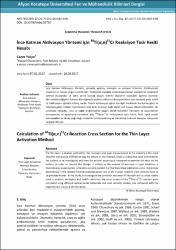| dc.contributor.author | Yalçın, Caner | |
| dc.date.accessioned | 2017-10-11T11:18:30Z | |
| dc.date.available | 2017-10-11T11:18:30Z | |
| dc.date.issued | 2017 | |
| dc.identifier.issn | 2149-3367 | |
| dc.identifier.uri | http://fenbildergi.aku.edu.tr/wp-content/uploads/2017/10/021105-432-439.pdf | |
| dc.identifier.uri | http://hdl.handle.net/11630/4631 | |
| dc.description.abstract | İnce Katman Aktivasyon Yöntemi, sanayide aşınma, korozyon ve erozyon hızlarının ölçülmesinde
kullanılan en hassas ve güçlü yöntemdir. Yöntemde öncelikle araştırılmak istenen yüzeyde bir radyoaktif
katman oluşturulur ve daha sonra burada oluşan aktivite ölçülerek yüzeydeki aşınma incelenir.
Aktivitedeki değişimin katman kalınlığındaki azalma miktarına dönüştürülmesi için deneysel yada teorik
bir kalibrasyon eğrisine ihtiyaç vardır. Teorik kalibrasyon eğrisi için ilgili maddenin durdurma gücü ve
meydana gelen nükleer reaksiyonun tesir kesti enerjiye bağlı olarak çok hassas olarak bilinmelidir. Bu
çalışmada havacılık, uzay ve sağlık endüstrisinde yaygın olarak kullanılan Titanyum ve alaşımlarının
korozyonunu ve aşınmasını incelemek için, 48Ti(α,n)51Cr reaksiyonun tesir kesiti, farklı optik model
potansiyelleri ve düzey yoğunluğu modelleri ile hesaplanmış ve literatürde bulunan deneysel sonuçlarla
karşılaştırılmıştır. | en_US |
| dc.description.abstract | The thin layer activation method for the corrosion and wear measurement at the industry is the most
effective and precise method among the others. In the method, firstly a radioactive layer is formed on
the surface to be investigated and then the activity occurring is measured to examine the wear on the
surface. In order to convert the change in activity to the amount of decrease in layer thickness, a
theoretical or experimental calibration curve is needed. For the theoretical calibration curve, the energy
dependence in the related material stopping power and in the nuclear reaction cross sections have to
be precisely known. In this study, to investigate the corrosion and wear of Titanium and its alloys widely
used in aviation, aerospace and health industries, the cross section of the 48Ti(α,n)51Cr reaction were
calculated using different optical model potentials and level intensity models, and compared with the
experimental results at the literature. | en_US |
| dc.language.iso | tur | en_US |
| dc.publisher | Afyon Kocatepe Üniversitesi, Fen ve Mühendislik Bilimleri Dergisi | en_US |
| dc.identifier.doi | 10.5578/fmbd.59767 | en_US |
| dc.rights | info:eu-repo/semantics/openAccess | en_US |
| dc.subject | İnce Katman Aktivasyon Yöntemi | en_US |
| dc.subject | Reaksiyon Tesir Kesiti | en_US |
| dc.subject | Titanyum | en_US |
| dc.subject | Korozyon | en_US |
| dc.subject | Aşınma | en_US |
| dc.title | İnce Katman Aktivasyon Yöntemi için 48Ti(α,n)51Cr Reaksiyon Tesir Kesiti Hesabı | en_US |
| dc.title.alternative | Calculation of 48Ti(α,n)51Cr Reaction Cross Section for the Thin Layer Activation Method | en_US |
| dc.type | article | en_US |
| dc.relation.journal | Fen ve Mühendislik Bilimleri Dergisi | en_US |
| dc.department | Kocaeli Üniversitesi, Fizik Bölümü | en_US |
| dc.identifier.volume | 17 | en_US |
| dc.identifier.startpage | 432 | en_US |
| dc.identifier.endpage | 439 | en_US |
| dc.identifier.issue | 2 | en_US |
| dc.relation.publicationcategory | Makale - Ulusal Hakemli Dergi - Kurum Yayını | en_US |



















